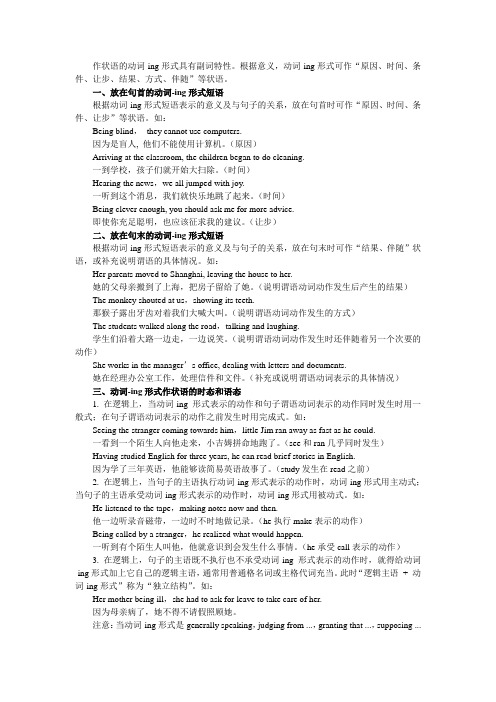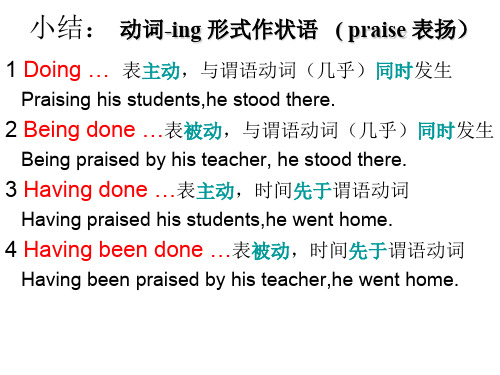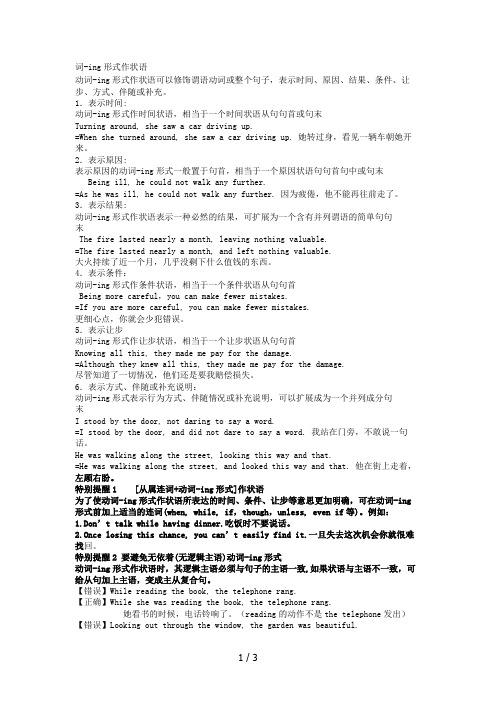动词ing做状语
动词-ing形式作状语

作状语的动词-ing形式具有副词特性。
根据意义,动词-ing形式可作“原因、时间、条件、让步、结果、方式、伴随”等状语。
一、放在句首的动词-ing形式短语根据动词-ing形式短语表示的意义及与句子的关系,放在句首时可作“原因、时间、条件、让步”等状语。
如:Being blind,they cannot use computers.因为是盲人, 他们不能使用计算机。
(原因)Arriving at the classroom, the children began to do cleaning.一到学校,孩子们就开始大扫除。
(时间)Hearing the news,we all jumped with joy.一听到这个消息,我们就快乐地跳了起来。
(时间)Being clever enough, you should ask me for more advice.即使你充足聪明,也应该征求我的建议。
(让步)二、放在句末的动词-ing形式短语根据动词-ing形式短语表示的意义及与句子的关系,放在句末时可作“结果、伴随”状语,或补充说明谓语的具体情况。
如:Her parents moved to Shanghai, leaving the house to her.她的父母亲搬到了上海,把房子留给了她。
(说明谓语动词动作发生后产生的结果)The monkey shouted at us,showing its teeth.那猴子露出牙齿对着我们大喊大叫。
(说明谓语动词动作发生的方式)The students walked along the road,talking and laughing.学生们沿着大路一边走,一边说笑。
(说明谓语动词动作发生时还伴随着另一个次要的动作)She works in the manager’s office, dealing with letters and documents.她在经理办公室工作,处理信件和文件。
动词-ing

非谓语动词之动词-ing形式一.动词-ing形式作状语1. 动词-ing形式做状语,其逻辑主语是句子的主语。
动词-ing形式做状语,是对谓语动词所表示的主语动作加以修饰或陪衬。
1),做时间状语Hearing the news, they all jumped for joy.听到这个消息,他们都高兴得跳了起来。
2),做原因状语Living far from the school, I have to get up early every morning.由于住得离学校远,我们只好每天早晨早起。
3)做结果状语He dropped the glass, breaking it into pieces.他把杯子弄掉了,结果摔得粉碎3)做条件状语Playing all day (= if you place all day), you will waste your valuable time.要是整天玩,你就会浪费宝贵的时间现在分词有一般式、被动式、完成式和完成被动式四种形式,每一种形式的否定式都是直接在前面加not构成。
一般式表示主动的一般性的动作或者正在进行的动作;被动式表示正在进行的被动的动作;完成式表示发生在谓语动作之前的主动的动作;完成被动式表示发生在谓语动作之前的被动的动作。
Pressed from his parents, and realizing that he has wasted too much time, the boy is determined to stop playing video games.(2012·福建高考)由于来自父母的压力,以及认识到浪费了太多的时间,这个男孩决定不玩电子游戏了。
Not having fully recovered from the operation, the patient was advised to stay in hospital for another two weeks.手术后还没有完全康复,这位病人被建议再住院两周。
19.动词-ing形式作状语

动词-ing形式作状语吴国斌动词-ing形式作状语时,可以表示时间、原因、结果、条件、方式或伴随动作,相当于相应的状语从句。
1.作时间状语(有时可以在动词-ing形式前加一个表时间的连词,如when,while等)相当于时间状语从句Hearing the news, they immediately set off for Shanghai.=When they heard the news, they immediately set off for Shanghai.听到这个消息,他们立即动身去上海。
Having turned off the TV set, he began to go over his lessons.=After turning off the TV set, he began to go over his lessons.关掉电视机以后,他便开始复习功课。
2.作原因状语,相当于原因状语从句Being too young, he couldn’t join the army.=As he was too young, he couldn’t join the army.因为年幼,他不能参军。
Not knowing how to get there, I had to ask the way.=As I did not know how to get there, I had to ask the way.因为不知道如何到那里,我只得问路。
3.作条件状语,相当于条件状语从句Using your head, you’ll find a good way.=If you use your head, you’ll find a g ood way.动动脑,你就会想出一个好办法。
Driving too fast, you will damage the car.=If you drive too fast, you will damage the car.如果开车太快,你会把车子弄坏的。
动词-ing-形式作状语

with joy.
= Hearing the news, they all jumped with joy. • 作原因状语 Because I was tired, I stopped to take a rest
= Being tired, I stopped to take a rest. Because we don’t know her address, we couldn’t get in touch with her. = Not knowing her address, we couldn’t get in touch with her.
1 Feeling tired, I went to bed .
2 Having finished the work , I went to bed .
• 作时间状语 While I was walking along the street, I met Mary
= Walking along the street, I met Mary.
• 作条件状语 If you turn the left, you will find the school
= Turning to the left, you will find the school. If you work hard, you'll succeed.
=Working hard, you'll succeed. • 作让步状语
3 Having done …表主动,时间先于谓语动词
Having praised his students,he went home.
动词ing形式作状语

三、表示条件(多置于句首)例:
1. Working hard(=If you work hard), you will succeed.
四、表示结果(多置于句末)例:
1. The snow lasted a week, leading to a serious traffic jam in the area.
2. The visiting minister expressed his satisfaction with the talks, ___ that he had enjoyed his stay here. A. having added B. to add C. adding D. added
注意:-ing形式的完成式having done 表示其动作发生在谓语动词 的动作之前,一般作时间或原因状 the homework, she went shopping. =When she had finished the homework, she went shopping.
5、_____ from his clothes, he is not so poor. A. Judged C. To judge B. Judging D. Judge
6、_____ such heavy pollution already, it may now be too late to clean the river. A. Having suffered B. Suffering C. To suffer D. Suffered
3、European football is played in 80 countries, ____ it the most popular sport in the world. A. making B. makes C. made D. to make
ing做状语经典例句

ing做状语经典例句在英语中,ing作状语是动词的一种非谓语形式,它在句子中可以表示行为或状态的特征或方式。
以下是几个ing作状语的经典例句:1. He sat there reading a newspaper.(他坐在那里读报纸。
)在这个句子中,“reading a newspaper”是状语,表示“他”的状态是正在读报纸。
2. She came running to me.(她跑过来找我。
)在这个句子中,“running”是状语,表示“她”过来的方式是跑着来的。
3. He loved hiking in the mountains.(他喜欢在山里徒步旅行。
)在这个句子中,“hiking in the mountains”是状语,表示“他”喜欢做的事情是在山里徒步旅行。
4. I was surprised to find him crying in the corner.(我惊讶地发现他在角落里哭泣。
)在这个句子中,“crying in the corner”是状语,表示“他”的状态是在角落里哭泣。
5. She swam across the river to reach the other side.(她游过河到达了另一边。
)在这个句子中,“across the river”是状语,表示“她”游泳的方式是横着游过河。
6. He jumped up and down excitedly.(他兴奋地跳上跳下。
)在这个句子中,“excitedly”是状语,表示“他”跳跃的方式是因为兴奋而跳跃。
7. She sang beautifully, much to our surprise.(她唱得很美,让我们大吃一惊。
)在这个句子中,“beautifully”是状语,表示“她”唱歌的方式是唱得很美。
8. He lay in bed, awake all night.(他躺在床上,整夜没睡。
)在这个句子中,“awake all night”是状语,表示“他”的状态是整夜保持清醒。
动词ing形式作状语

词-ing形式作状语动词-ing形式作状语可以修饰谓语动词或整个句子,表示时间、原因、结果、条件、让步、方式、伴随或补充。
1.表示时间:动词-ing形式作时间状语,相当于一个时间状语从句句首或句末Turning around, she saw a car driving up.=When she turned around, she saw a car driving up. 她转过身,看见一辆车朝她开来。
2.表示原因:表示原因的动词-ing形式一般置于句首,相当于一个原因状语句句首句中或句末Being ill, he could not walk any further.=As he was ill, he could not walk any further. 因为疲倦,他不能再往前走了。
3.表示结果:动词-ing形式作状语表示一种必然的结果,可扩展为一个含有并列谓语的简单句句末The fire lasted nearly a month, leaving nothing valuable.=The fire lasted nearly a month, and left nothing valuable.大火持续了近一个月,几乎没剩下什么值钱的东西。
4.表示条件:动词-ing形式作条件状语,相当于一个条件状语从句句首Being more careful,you can make fewer mistakes.=If you are more careful, you can make fewer mistakes.更细心点,你就会少犯错误。
5.表示让步动词-ing形式作让步状语,相当于一个让步状语从句句首Knowing all this, they made me pay for the damage.=Although they knew all this, they made me pay for the damage.尽管知道了一切情况,他们还是要我赔偿损失。
动词ing在句末作状语

动词ing在句末作状语动词ing在句末作状语,通常用于表达动作或状态与主句谓语同时进行或补充说明其目的、原因、结果等。
以下是一些例句:1. She walked out of the room, humming a tune.她哼着曲子走出了房间。
2. He's studying for the exam, using flashcards.他正在用闪卡复习考试内容。
3. They left the party early, feeling tired.他们感到疲倦,就早早离开了派对。
4. I calmed myself down, taking deep breaths.我通过深呼吸使自己冷静下来。
5. The children played happily, laughing and running around.孩子们开心地玩耍着,笑着、跑来跑去。
6. He answered the phone, talking softly.他接起电话,轻声交谈。
7. The dog watched eagerly, wagging its tail.狗兴致勃勃地观察着,摇着尾巴。
8. She left the house in a hurry, leaving the door wide open.她匆忙离开屋子,把门敞开着。
9. They walked home, holding hands.他们手牵手走回家。
10. The car stopped suddenly, screeching to a halt.车突然停下来,发出刺耳的刹车声。
11. He finished his dinner, burping loudly.他吃完晚饭,打了一个响亮的饱嗝。
12. She tripped on the stairs, tumbling down to the bottom.她在楼梯上绊倒了,摔倒了底部。
- 1、下载文档前请自行甄别文档内容的完整性,平台不提供额外的编辑、内容补充、找答案等附加服务。
- 2、"仅部分预览"的文档,不可在线预览部分如存在完整性等问题,可反馈申请退款(可完整预览的文档不适用该条件!)。
- 3、如文档侵犯您的权益,请联系客服反馈,我们会尽快为您处理(人工客服工作时间:9:00-18:30)。
动词ing做状语
动词ing做状语
1、表示目的
有时,动词的ing形式用来表示一个人为了做某事而做某事,多用于以下句子中:
He was putting on his coat in order to leave home.
他穿上外套准备离开家。
She stayed up late studying for the exam.
她为考试而熬夜学习。
2、表示时间
有时,动词的ing形式用来表示在某一段时间内做某事,多用于以下句子中:
He has been working in the company for five years.
他在公司工作了五年了。
She has been staying at home for two months.
她在家里呆了两个月了。
3、表示原因
有时,动词的ing形式用来表示一个人做某事的原因,多用于以下句子中:
He called to apologize for losing her address.
他打电话道歉是因为他把她的地址弄丢了。
She refused to go to the park because of raining.
她因为下雨而拒绝去公园。
